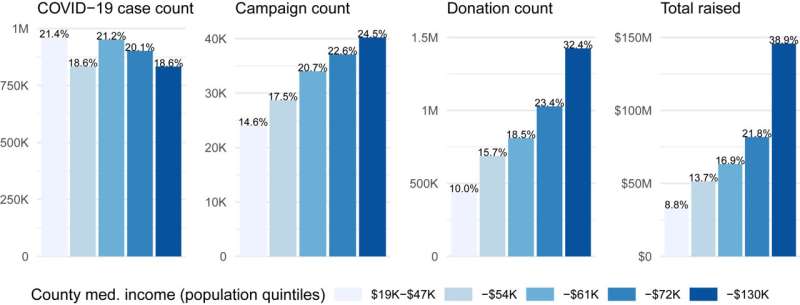Pandemic-era crowdfunding more common, successful in affluent communities

During the first several months of the pandemic—when communities locked down, jobs were lost, PPE was scarce and store shelves were cleared —thousands of people turned to online crowdfunding to meet their needs.
But a new University of Washington analysis of requests and donations to the popular crowdfunding site GoFundMe, along with Census data, shows stark inequities in where the money went and how much was donated.
A study published June 15 in Social Science & Medicine found more than 175,000 COVID-19-related GoFundMe campaigns in the U.S., raising more than $416 million, from January through July 2020. Researchers found that affluent and educated communities created more fundraising campaigns, and received more in return, than other communities with fewer resources.
What's more, researchers found that campaign success, overall, was hard to come by. Some 43% of campaigns didn't receive a single donation. More than 90% of campaigns didn't meet their goals.
Researchers say the study reveals the challenges inherent to online crowdfunding, as well as its capacity to reinforce existing socioeconomic divides.
"Our study shows that even though COVID-19 had an impact across the country, the places that benefitted most from crowdfunding were the places that already had the most resources available," said the study's lead author, Mark Igra, a graduate student in sociology at the UW.
While some results may not be surprising from an economic standpoint—people in wealthier communities likely have more money to donate to charitable causes—researchers say the results highlight other factors contributing to campaign success. For example, people in more educated communities are likely better able to tap into existing social networks to raise money—whereas in communities where education is lower the needs may be greater, but residents may have fewer connections to affluent donors, and fewer campaigns reach their goals.
Other recent research has explored online crowdfunding specific to medical needs, finding that campaigns are common, but often unsuccessful, in communities where health care resources and insurance coverage are lacking. This study is believed to be the first to examine online crowdfunding as a broader crisis response, and its impacts on inequality.
In examining COVID-19-related fundraising campaigns that mentioned a need associated with the pandemic, such as a lost job and a need for food or rent money, researchers eliminated those that were part of a GoFundMe program providing matching funds for businesses, leaving about 164,000 campaigns to sort through. Because demographic data about crowdfunding users is hard to come by, researchers analyzed campaign data at a county level and compared it with other county-level socioeconomic characteristics using U.S. Census data. Among their findings:
- The median campaign goal was $5,000, with a median of two donations and only $65 raised.
- The top 1% of campaigns received nearly one-quarter of all the money raised.
- As COVID-19 cases and unemployment rose in a variety of communities, more fundraising campaigns were created in communities with higher education and income levels.
- Counties where 35% of residents are college graduates can expect about 50% more campaigns than counties where only 12% are graduates.
- Counties with a median household income of at least $130,000 raised nearly $150 million, almost three times as much as counties with a median income of $19,000 to $47,000, even though the populations of those counties are about the same.
- A keyword search of GoFundMe campaign requests found that those identifying business and medical needs yielded more donations than those campaigns that mentioned personal financial needs.
GoFundMe's approach of highlighting and promoting certain campaigns, whether those tied to a high-profile person or those that are gaining attention and growing at a faster rate, means success begets success, researchers said.
Co-author Nora Kenworthy, an associate professor of nursing and health studies at UW Bothell, said the study shows who's able to leverage resources in a crisis, and that the nature of online crowdfunding as a social media platform exacerbates the dynamics of a crisis.
"During the pandemic, there's been a lot of talk of communities supporting communities, but we need to ask, where does that happen, for whom, and who gets left out?" said Kenworthy. "The more we rely on social media platforms to shape that community response, the more we are blinded to where help is not happening and who's not getting assistance."
That's not to say crowdfunding doesn't serve a valuable purpose, the authors point out. It's more a sign "that we shouldn't shy away from more structural solutions," Kenworthy said, such as government-run programs that could cast a wider net than crowdfunding can cover.
"People's fundamental needs for health and well-being shouldn't be dependent on such an unpredictable source of funds. It's really a question of what is our shared commitment to the things people should have, regardless of whether they can be successful at crowdfunding," Igra said. "It's a good thing that people are helping, but people who aren't being helped aren't visible."
More information: Mark Igra et al, Crowdfunding as a response to COVID-19: Increasing inequities at a time of crisis, Social Science & Medicine (2021). DOI: 10.1016/j.socscimed.2021.114105
Journal information: Social Science & Medicine
Provided by University of Washington




















